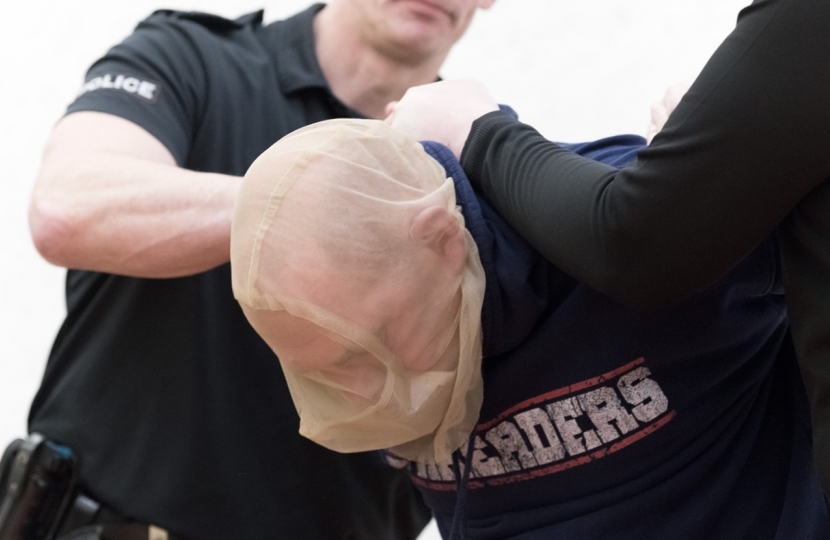Lincolnshire Police has recently purchased 5,000 Spit and Bite Guards to help protect against assaults by spitting and biting.
Spit and Bite Guards are being issued to all front-line officers as a protective measure to help prevent being spat on and bitten.
The medically-approved device is a tactical option used to stop individuals spitting or biting during interactions with police officers – an act that is an assault in itself.
A guard, which is a hood made of a thin breathable mesh material, is placed over the head of an individual who is believed to be about to spit or bite, or who has already done so.
The psychological impact of suffering such an assault is far-reaching. It is known that the risk of infection from a blood borne virus is low, it is the effect of the wait to find out if the worse effect of such an act has happened that can be agonising for the individual who has been the victim. This can sometimes take weeks to be resolved. One Lincolnshire police officer who was subjected to such an assault in which he had blood spat at him said:
“I'd rather be punched than spat on.”
Assistant Chief Constable Shaun West said:
“We’ve made spit and bite guards available to officers on our front-line as a protective piece of kit to help protect against the worst effects of spitting and biting.
“None of our officers should have to endure assaults of any kind and being bitten or having blood spat at you is particularly unpleasant. It should never be considered as an acceptable part of the job but, sadly, it does happen”
Between the start of April last year and the end of November there were 107 occasions where officers reported being spat at during an incident. On average, that works out around 13 incidents a month.
Assistant Chief Constable West continued:
“Those numbers are simply unacceptable. There is a tangible effect on an individual of being subjected to such an assault and we will do everything we can to protect against this type of assault on officers.
“Spit and bite guards are medically approved and all officers who may need to use one will be fully trained as to how to use them safely and proportionately.
“Like Taser, they are a necessary device which can help safely resolve a situation via a lower use of force than other options. Without a spit and bite guard an officer would likely have to either pull a clothing garment up over a person’s head or detain a person on the floor on their stomach, and turn their head to the side to prevent spitting and biting. This is often uncomfortable for that person and can be distressing.
“This is about creating a safer Lincolnshire, both for our officers who serve the community and all the residents who live in this county.
“All of our officers who will be issued one of the guards will be fully trained in their safe and proportionate use and I’m confident they will make a huge difference in protecting against this most unpleasant type of assault and help keep our teams safe.”
An in-depth piece of work was carried out before the spit and bite guards were brought into force. This considered different models, consulted with peers in some of the other 25 forces that currently use spit and bite guards, and follows national guidance on use. The guards will be introduced and deployed with officers once all practical training has been completed.
Special consideration on use will be given to people with mental health concerns; and substantial consideration on use will be given to people with learning difficulties, prolonged behavioural difficulties or who have autism spectrum disorders and conditions, with officers ensuring that all other tactical and communication options have been considered prior to use of the guard, and only then where there is substantial risk to officers, the subject or the public. Exceptions will be made in their use on any pregnant women or anyone who is bleeding or vomiting heavily or with breathing difficulties or illnesses.
Police and Crime Commissioner Marc Jones said:
“I have for some time been very supportive of policing across the country having access to spit guards and I am very pleased to see Lincolnshire join the majority of forces who have, after due consideration, deployed them to protect their officers from assault.
“It is vital that we ensure officers are protected so they can continue to keep our communities safe and there is a simple message to send to anyone who would wish not to be placed in a spit guard, don’t spit at or bite police officers.
“Spitting and biting is a particularly nasty form of assault which can affect officers both physically and mentally, often leading to months of anxiety for them and their families as results from invasive tests for diseases are carried out. No-one should be subjected to such a vile form of assault.
“The introduction of spit guards is an operational one for the Chief Constable to make but I am delighted he has done so and he has my full support as do the officers who face assault on the streets whilst keeping us all safe.”
Training for the use of spit and bite guards will include following guidance from the force policy relating to spit and bite guards:
- Officers will give a clear verbal warning to an individual that they can and will issue a spit and bite guard if behaviour relating to spitting and biting does not desist.
- This will be based on a situation and behaviour where a subject has spat at an officer, is spitting, or appears to be about to spit.
- There is no time limit as to how long the spit and bite guard can be worn because it is made from a breathable material but an individual wearing one will not be left alone.
- Once the risk of spitting or biting has passed the guard will be removed.



